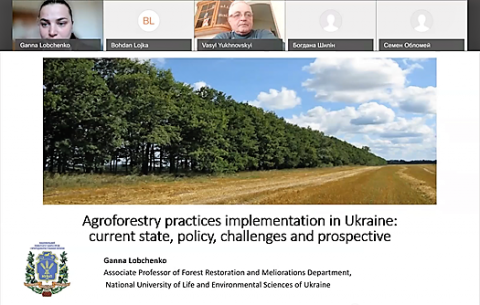An important activity of higher education institution is the training of Masters – specialists from the second level of higher education, taking a first step in a scientific carrier and towards future PhDs. In recent years, the number of English-language courses at the National University of Life and Environmental Sciences of Ukraine has grown, which gives the opportunity to attract students from other countries and cooperate with universities worldwide. High standards of teaching are observed to increase the competitiveness of the National University of Life and Environmental Sciences of Ukraine (NULES) in the education market.
For the first time, the English-language course "Agroforestry systems, practices, technologies", was developed for students majoring in forestry in the master’s program "Forest Management in Eastern Europe". The course was developed by three members of the Department of Forest Restoration and Melioration: Prof. Vasyl Yukhnovskyi, ass. Prof. Oleksandr Sovakov and Ganna Lobchenko, each of whom was responsible for separate modules.
Biodiversity-based production methods, including agroforestry, are considered as a potential solution to both mitigate climate change and improve long-term economic sustainability. Furthermore, agroforestry receives raising attention by policy makers and within the Common Agricultural Policy of the European Union. Also our students study with interest the possibilities and experiences of agroforestry, not only from lectures, but also through direct participation in webinars with foreign experts in this area.
In particular, on May 11 and 18, two parts of the international scientific-practical online seminar "The Contribution of Agroforestry to Sustainable Development Goals" took place. In the first part of the seminar, the guest speaker was Czech national delegate for EURAF, Bohdan Lojka, who covered the issue of agroforestry in the Czech Republic, and in the second part, students learned from Niels Thevs about the peculiarities of agroforestry in arid conditions in Kyrgyzstan.
Bohdan began his report on major natural problems, such as wind and soil erosion, as well as biodiversity loss due to the large number of arable lands that are not forested. In addition, the problems of the political aspect, namely the lack of any legal conditions and the lack of definition of agroforestry as a functioning land use system. The following categories of agroforestry are important for the Czech Republic: planting of tree species on permanent lands, grazing of cattle on forested lands or gardens. It should also be noted that after interviewing farmers and finding out their attitude to such practices, quite pleasant results were obtained, because of the 500 participants, about 70% practice farming using agroforestry systems.
Niels Thevs, coordinator of the research program for Central Asia (Kyrgyzstan) with ICRAF ECA, highlighted the main aspects of the potential of agroforestry for sustainable land use. The biggest problem of intensive land use in Kyrgyzstan is its complete dependence on irrigation, the need for large amounts of water and the erosion that occurs when it is scarce. He pointed out the most of the plantations on the lands of experimental agricultural use suffered from drought and died, so they did not perform the function of protection. However, after several years of research and hard work, a network of plantations of fast-growing poplar hybrids was created and it was scientifically proven that under the influence of field protection crops the yield increased to 17% and the intensity of erosion decreased several times. The main goals of agroforestry in Kyrgyzstan's irrigated agriculture are the creation of new poplar hybrids as a source of income and an element of control of efficient water consumption, as well as the transformation of agriculture into more resistant to "water stress" and alternative approaches to overcoming the crisis.
The speeches were followed by a lively discussion, given that Ukraine, the Czech Republic and Kyrgyzstan had a similar approach to the introduction of agroforestry in the past, but the differences in climatic, economic and political conditions are now manifested in different approaches.
Ganna Lobchenko presented a report on the implementation of agroforestry practices in Ukraine. Currently, due to incorrect priority and desire for quick material benefits, a huge area of agricultural land in Ukraine is subject to wind, soil and water erosion, and the transformation of steppe meadows into agricultural land leads to natural disasters such as dust and sandstorms, desertification. In addition, due to the long absence of the real owner of the already existing protective strips, the economic crisis, as well as insufficient awareness of the importance of windbreaks, illegal logging and general degradation of previously established plantations is taking place. The speaker stressed that the restoration of field protection systems and the creation of new ones is of great importance for Ukraine, as it helps counteract the development of erosion processes, increases yields by 10-20% with the loss of only 3% of arable land, and helps preserve biodiversity in agroecosystems. The key participants in the process of implementing agroforestry practices are scientists, environmental activists, private and charitable organizations, farmers focused on permaculture and organic farming.
For students of the English-language master's program, this experience of communication with experts from around the world allows you to learn more about special disciplines and think more globally, which will certainly help to reach significant heights in further professional development.
The course ended with an exam, which was successfully passed by the students of the group - Vladislav Pavlyuchenko, Igor Mishchenko, Bohdana Shylin and others.
Future masters of forestry unanimously came to the conclusion that the subject for them became saturated with new relevant material, modern methodological approaches and enriched their practical skills in agroforestry.
Vasyl Yukhnovskyi, professor,
Oleksandr Sovakov, Ganna Lobchenko, associate professors












